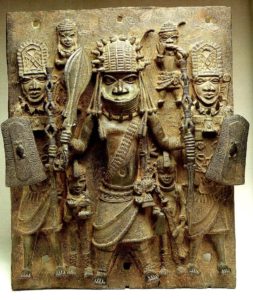The spirits of the dead may play a much bigger role in our health, wealth and happiness than we realize, says Dave Cumes M.D., an accomplished surgeon who is also known for his expertise in African healing traditions.
Cumes has taught at Stanford University and has a private urology practice in Santa Barbara, California. He is also a fully initiated “sangoma”, or medicine man who spent years studying the sacred healing traditions of his native South Africa. 
He is committed to bridging Western medicine and African healing wisdom.
“Western scientists believe that they are on the cutting edge of the new age of healing. However, we may have missed the boat entirely. We may be technical wizards but when it comes to the human spirit, we are really only beginners,” says Cumes.
“Many sangomas cannot read or write but they understand the principles of healing better than most Western-trained physicians,” adds Cumes, who lectures extensively and also provides spiritual readings, or divination sessions for clients.
Cumes believes Westerners can learn a lot from African sacred traditions. “Although some of the principles are difficult to understand, they work. They are the roots of healing, and they are still practiced to this day. We can only benefit from what we can learn from them,” Cumes says.
Perhaps Westerners can start by developing a relationship with their ancestors. “Indigenous African people believe in the ancestors and that they are there to help, protect and sustain us. If your ancestors turn aside, you are defenseless in life, like a paper blowing in the wind. If we are attentive and listen carefully for their messages, we will enjoy more health, wealth, and happiness,” he says.
In his book, Africa In My Bones, Cumes cites a study conducted by researchers at John Hopkins Medical Center which suggests a link between health and one’s relationship or lack of relationship with family.
“Researchers at the John Hopkins Medical Center studied the health of a group of more than one thousand medical students from the classes of 1948 to 1964. Researchers discovered that those physicians who developed cancer had much lower scores on closeness to parents, especially to their fathers,” says Cumes.
Cumes, who will share some of his insights in “Across The King’s River,” an upcoming documentary film by James Weeks that explores African healing traditions and modern science, says the research is still ongoing. “As Westerners, we might say that the parent’s love created lifelong balance, stability, and meaning and that it facilitated good health in the child. Indigenous African belief, however, may attribute the progeny’s good health to the dead parents’ and the grandparents’ protective spirits,” explains Cumes.
Weeks said it is gratifying to see that the Western medical establishment is finally starting to see value in what African healers have been saying and doing for centuries. “Maybe one day when you visit your doctor in the West or a psychologist, they’ll ask: ‘Do you have a relationship with your ancestors?” says Weeks with a laugh.
And how does one build a relationship with ancestors?
“One of the most effective ways to connect with ancestors is to set up an ancestor altar or shrine,” says popular African shaman Malidoma Some. “Doing so provides us with an invaluable tool to help focus our attention and awareness of their presence in our lives. It is also a tool to help deepen and nurture a relationship with them. There is no correct way to build a shrine to the Ancestors; use your intuition and imagination! It can be as simple or elaborate as you wish. Let the ancestors guide you!”
Malidoma, one the leading voices of African spirituality in the West, will also be featured in the film Across The King’s River. On his website, www.malidoma.com, Malidoma provides the following tips for building an ancestral shrine.
Choose a comfortable location in your home (or on your land) that can be designated as sacred space.
Choose a table or flat surface of any size or shape. Using a space on the floor or ground is fine.
You can choose to cover the surface or not. If you do, choose a cloth of any color or fabric. Items to put on the shrine can include:
Photographs of deceased family members or names written on paper
Cherished personal items passed down to you from relatives
A glass or bowl of water
Candles
Flowers or plants
Rocks or dirt from your Ancestors’ place of birth or homeland
Food and drink. This can be a small portion of your meals set aside for the Ancestors. Or you can place fresh fruit on the shrine
Spirits of alcohol, i.e. vodka, gin, rum, whiskey
Keep in mind that what is important is your sincere effort and good intention. Building an altar to the ancestors can be fun! There will come a time when the Ancestors will speak to you about what they want on their shrine. Pay attention and just listen!
How you honor and revere your ancestors is a personal thing. At your altar you can pray, talk, sing, chant, cry, meditate, recite poetry, etc. You can whisper or shout to them the most intimate details of your life. There is no right or wrong way to communicate with them and pay your respects. The important thing is that you do, and that you are sincere and genuine. It must come from your heart! In return, the ancestors will provide guidance, encouragement, and support. In time, your relationship with them will grow and you may find that you look forward to a daily commune with your ancestors.
For more information on Across The King’s River, visit www.acrossthekingsriver.com
